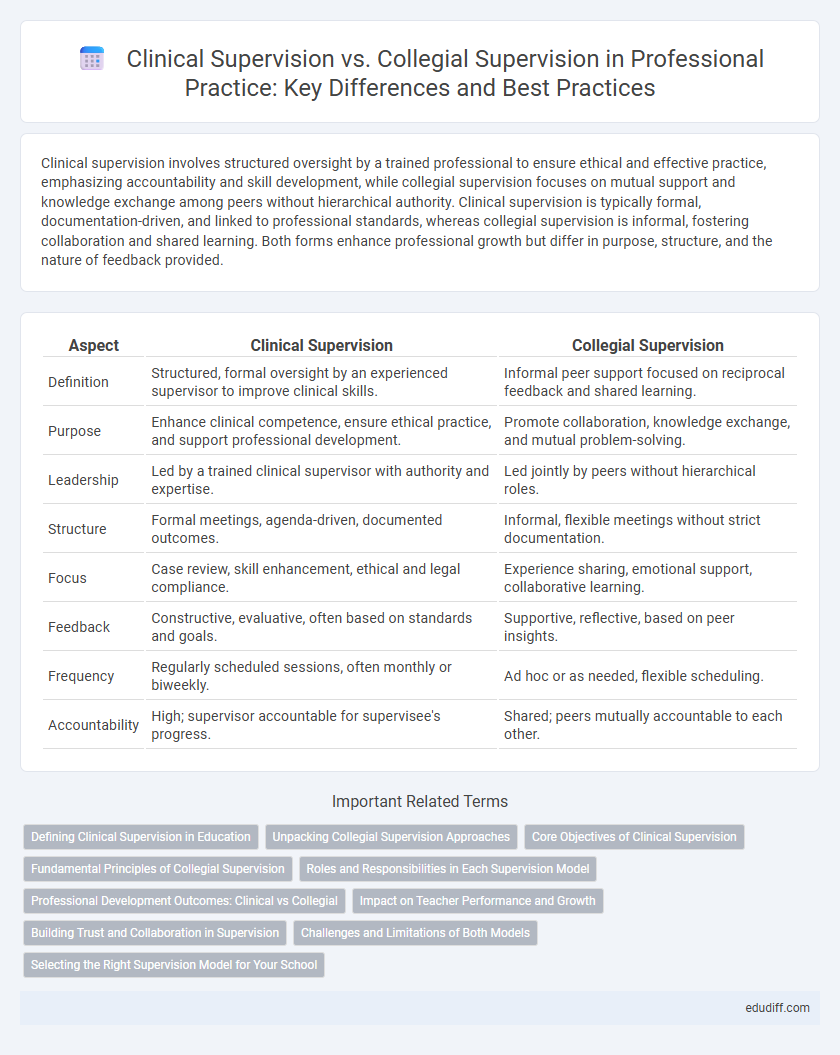Clinical supervision involves structured oversight by a trained professional to ensure ethical and effective practice, emphasizing accountability and skill development, while collegial supervision focuses on mutual support and knowledge exchange among peers without hierarchical authority. Clinical supervision is typically formal, documentation-driven, and linked to professional standards, whereas collegial supervision is informal, fostering collaboration and shared learning. Both forms enhance professional growth but differ in purpose, structure, and the nature of feedback provided.
Table of Comparison
| Aspect | Clinical Supervision | Collegial Supervision |
|---|---|---|
| Definition | Structured, formal oversight by an experienced supervisor to improve clinical skills. | Informal peer support focused on reciprocal feedback and shared learning. |
| Purpose | Enhance clinical competence, ensure ethical practice, and support professional development. | Promote collaboration, knowledge exchange, and mutual problem-solving. |
| Leadership | Led by a trained clinical supervisor with authority and expertise. | Led jointly by peers without hierarchical roles. |
| Structure | Formal meetings, agenda-driven, documented outcomes. | Informal, flexible meetings without strict documentation. |
| Focus | Case review, skill enhancement, ethical and legal compliance. | Experience sharing, emotional support, collaborative learning. |
| Feedback | Constructive, evaluative, often based on standards and goals. | Supportive, reflective, based on peer insights. |
| Frequency | Regularly scheduled sessions, often monthly or biweekly. | Ad hoc or as needed, flexible scheduling. |
| Accountability | High; supervisor accountable for supervisee's progress. | Shared; peers mutually accountable to each other. |
Defining Clinical Supervision in Education
Clinical supervision in education is a structured process where experienced educators observe, support, and provide constructive feedback to enhance teaching practices and student outcomes. It emphasizes reflective practice, professional development, and adherence to educational standards. Unlike collegial supervision, which is informal and peer-based, clinical supervision involves a designated supervisor with expertise and evaluative responsibilities.
Unpacking Collegial Supervision Approaches
Collegial supervision emphasizes peer collaboration, fostering mutual feedback and shared learning among professionals to enhance clinical competence without hierarchical oversight. It supports reflective practice through open dialogue and critical appraisal, promoting accountability in a non-evaluative environment. This approach encourages continuous professional development by leveraging collective expertise and diverse perspectives within the clinical team.
Core Objectives of Clinical Supervision
Clinical supervision focuses on enhancing the supervisee's professional competence, ensuring client safety, and promoting ethical practice through structured feedback and case review. Core objectives include developing clinical skills, fostering professional growth, and maintaining accountability within therapeutic settings. In contrast, collegial supervision emphasizes peer support and collaborative problem-solving without formal evaluative components.
Fundamental Principles of Collegial Supervision
Collegial supervision emphasizes mutual respect, shared responsibility, and collaborative learning between peers, fostering a non-hierarchical environment for professional development. It prioritizes open communication, trust, and reflective dialogue to enhance clinical skills and decision-making. Core principles include equality, confidentiality, and ongoing reciprocal feedback, distinguishing it from the more directive approach of clinical supervision.
Roles and Responsibilities in Each Supervision Model
Clinical supervision involves a hierarchical relationship where the supervisor provides structured guidance, evaluates clinical skills, and ensures adherence to professional standards, emphasizing responsibility for client outcomes and competency development. Collegial supervision operates within a peer-based framework, promoting mutual support, shared problem-solving, and collaborative reflection without formal evaluation, focusing on professional growth and knowledge exchange. Roles in clinical supervision are directive and evaluative, while collegial supervision emphasizes equality, feedback exchange, and joint decision-making.
Professional Development Outcomes: Clinical vs Collegial
Clinical supervision offers structured guidance and evaluation that enhance clinical skills and adherence to evidence-based practices, leading to measurable improvements in patient care. Collegial supervision fosters peer support and collaborative learning, promoting reflective practice and professional growth through shared experiences. Both approaches contribute uniquely to professional development, with clinical supervision emphasizing competency and accountability, while collegial supervision nurtures interpersonal skills and continuous learning.
Impact on Teacher Performance and Growth
Clinical supervision enhances teacher performance by providing structured, evidence-based feedback and modeling effective instructional strategies, fostering measurable professional growth. Collegial supervision promotes collaborative reflection and peer support, which develops teacher confidence and adaptability but may lack the rigorous evaluation components of clinical methods. Combining both approaches can optimize ongoing professional development and sustained instructional improvement.
Building Trust and Collaboration in Supervision
Building trust and collaboration in clinical supervision hinges on structured feedback, clear boundaries, and mutual respect, fostering a safe environment for professional development. Collegial supervision emphasizes peer support through shared experiences and reciprocal learning, promoting collaboration without hierarchical constraints. Both models prioritize open communication and trust to enhance supervisory relationships and improve clinical outcomes.
Challenges and Limitations of Both Models
Clinical supervision often faces challenges such as power imbalances and potential biases, which may hinder open communication and self-reflection, while collegial supervision struggles with maintaining clear boundaries and authority, potentially leading to confusion in roles and decision-making. Both models encounter limitations in consistency and accountability, with clinical supervision requiring structured frameworks that can sometimes feel rigid, and collegial supervision relying heavily on mutual trust, which may not always be present. Effective supervision demands addressing these challenges through tailored approaches that balance control with collaboration to optimize professional development and client outcomes.
Selecting the Right Supervision Model for Your School
Choosing the appropriate supervision model for your school involves understanding the distinct roles of Clinical Supervision and Collegial Supervision. Clinical Supervision emphasizes structured feedback and performance evaluation to enhance teaching effectiveness, while Collegial Supervision fosters collaborative support and professional growth through peer interactions. Schools prioritizing measurable outcomes and accountability often benefit from Clinical Supervision, whereas those aiming to build a reflective and supportive culture may find Collegial Supervision more advantageous.
Clinical Supervision vs Collegial Supervision Infographic

 edudiff.com
edudiff.com